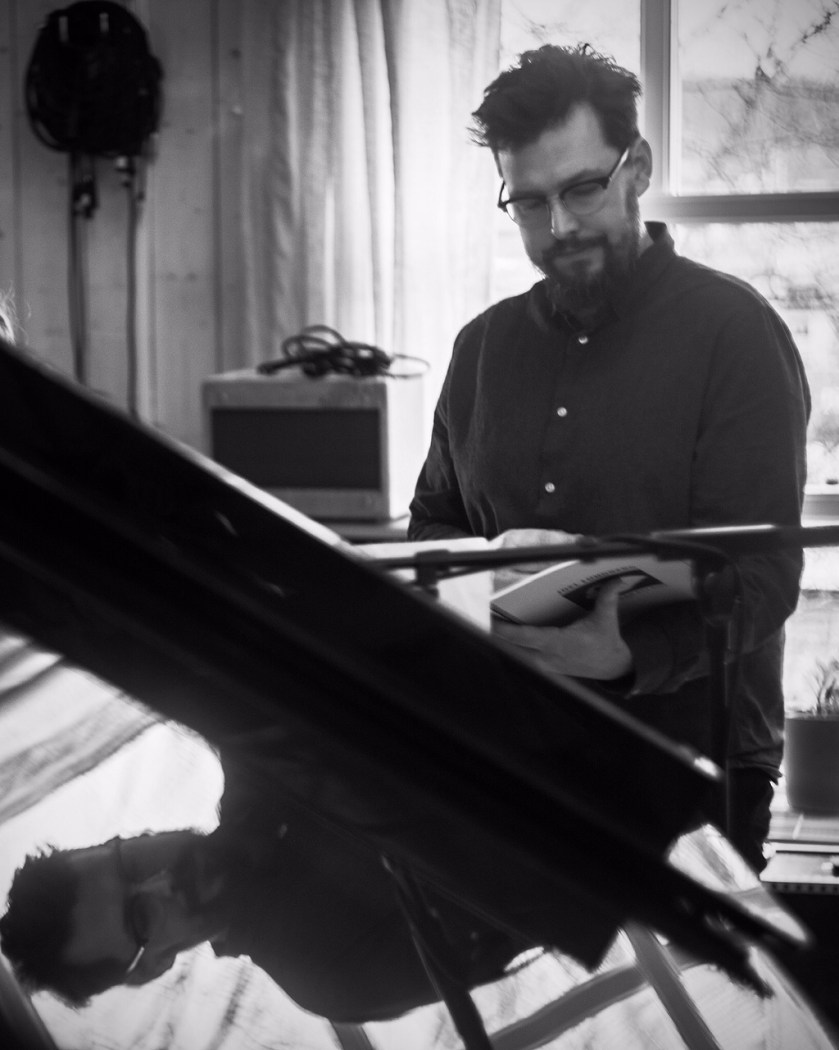Who or what inspired you to take up composing, and pursue a career in music?
It all started at a very early age. My parents had a very diverse record collection and that of course influenced me. Recordings of Bach, Jimi Hendrix, Beethoven, Frank Zappa, Sibelius and Otis Redding, to name a few. I would say that their record collection got me interested in the architectonics of music and in creating my own.
Who or what were the most significant influences on your musical life and career as a composer?
I grew up surrounded by instruments, so I used and learned them to write my own music. I played different instruments in several bands from the age of 6. I felt the power of performing music (especially my own) in front of an audience. Seeing how music can stir emotions and take a physical form, making people cry, laugh and dance had a great impact on me.
As a young boy I discovered Frank Zappa. Zappa opened up the door to a musical universe where no rules apply and taught me that music is more than then the genre under which it’s labeled. I started to write music for string quartets and horn quartets as well as for chamber orchestras and pipe organ. At same time I wrote music for the rock bands I played in.
I wanted to learn more about the building blocks of composition which later in life led to a Masters degree in composition and improvisation.
What have been the greatest challenges/frustrations of your career so far?
Musically I’ve been traveling all over the place, mentally but also physically. I’ve been a touring musician the larger part of my life. The last 20 years I’ve been touring in America, Japan and Europe, as a guitarist/composer in a progressive indie rock band.
Being a touring musician, composer and a dad is very time consuming and the fact that a day only has 24 hours in it is very frustrating.
My touring days are over, for now anyway, and I can now focus solely on composition and being a dad.
My latest project, MUSIC FROM A ROOM, eight compositions for piano, came with a lot of challenges. First off, I’m not a classically-trained pianist and writing for solo piano demands some sort of understanding for the instrument itself. I therefore studied the classics such as Bach, Beethoven and Debussy from a composer’s perspective.
Secondly, finding the right interpreter in order to make the transition from paper to audible form. After trying out several interpreters I found Kalle Stenbäcken through a mutual friend. Kalle is a very skilled concert pianist and it turned out that we shared a lot of musical references and preferences and spoke the same musical language and dialect.
What are the special challenges/pleasures of working on a commissioned piece?
Spontaneously I would say that it doesn’t matter if it’s a commissioned piece or not. My drive and creative process is still the same.
What are the special challenges/pleasures of working with particular musicians, singers, ensembles and orchestras?
I have always been interested in the complex relationship between the composer and the interpreter. For me as a composer it’s crucial that my visions and ideas stay intact and that they don’t get lost along the way, but at the same time leaving just the right amount of space for the interpreter to create and contribute within.
I would say that it is both a challenge and a pleasure working with other musicians. The challenge is to be able to speak the same musical language in order to get my composition from point A to B. The pleasure is when both me and the interpreter feel like winners.
Of which works are you most proud?
As many before me would probably say, the last.
MUSIC FROM A ROOM is commissioned, produced and payed for by me. The whole project is very personal, from the beautiful artwork painted by the artist Ola Mellberg to the music itself.
How would you characterise your compositional language?
My compositional language is very melodically driven but it is also about dynamic and rhythmical contrasts.
How do you work?
I usually start by constructing a theme or a frame wherein the composition can grow. The frame is not rigid in its form and can change over time.
I’m currently working on the successor to MUSIC FROM A ROOM. My working method is very simple and very analogue – I need is a pen, notation paper and a piano.
Who are your favourite musicians/composers?
Igor Stravinsky has been a favourite since childhood. But my inspiration sources ranges from Kraftwerk to Bartók, Mingus to Leonard Cohen, Debussy to Radiohead, to name a few.
As a musician, what is your definition of success?
My music has taken me on a journey around the world. I’ve met people and seen places that would have been impossible if it weren’t for music. Thank you music! For me that’s success.
What do you consider to be the most important ideas and concepts to impart to aspiring musicians?
Be open minded and curious. Remember that you do this for you and not for anyone else.
What is your most treasured possession?
My record collection!
Joel Lundberg’s new album MUSIC FROM A ROOM is available now
